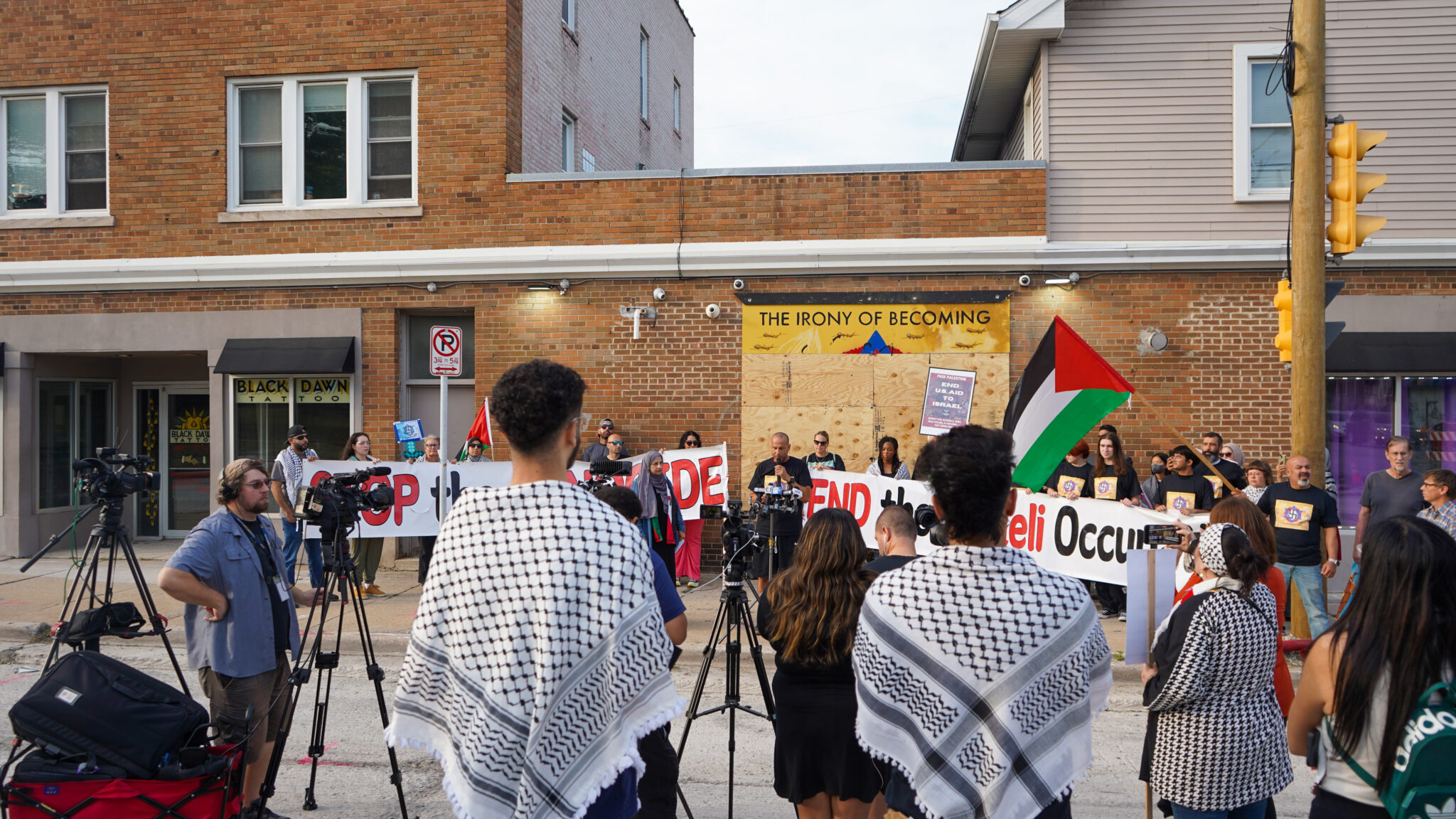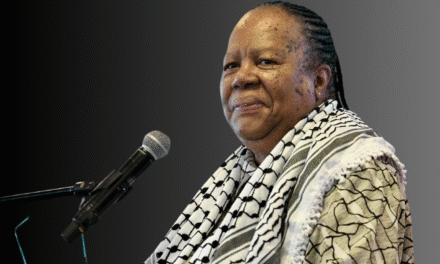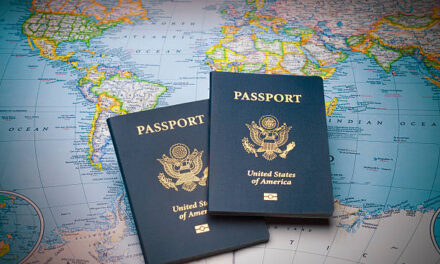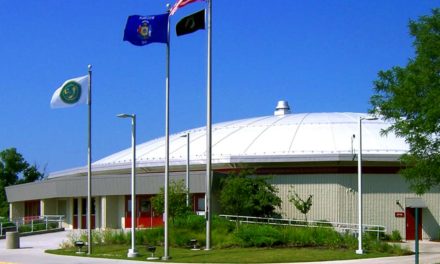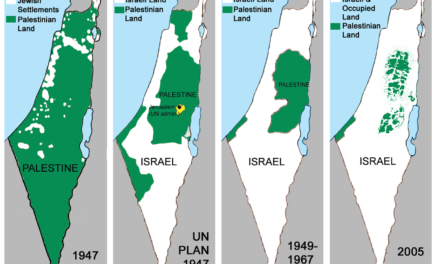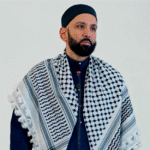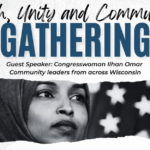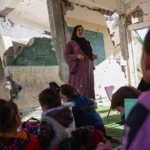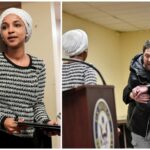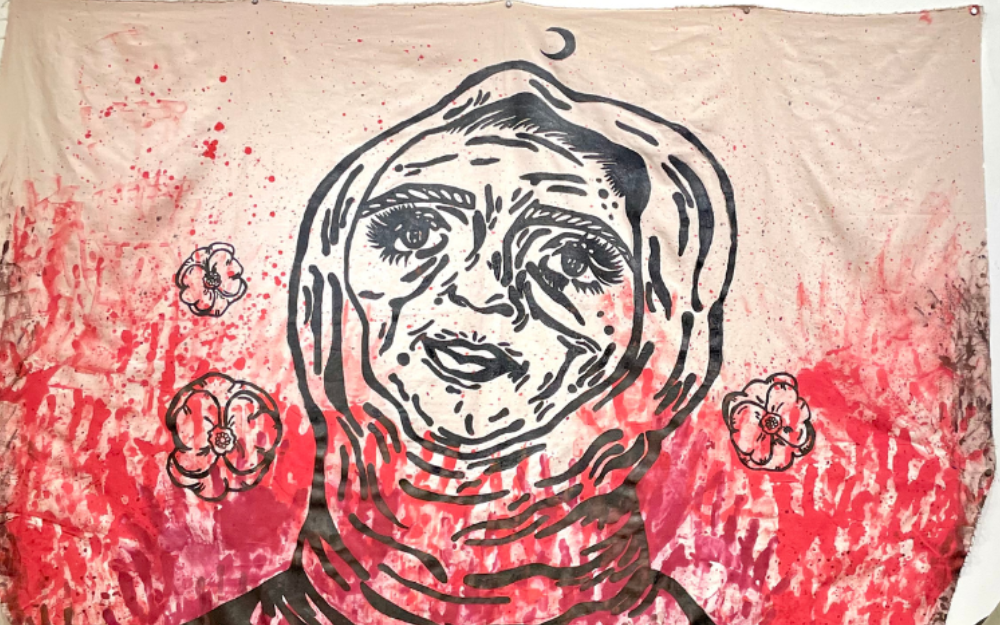
Photo by Adam Ossers
Fanana Banana co-founder Nayfa Naji’s painting, “Palestinian Hajah of 1948.”
Zionism is a racist, nationalist political movement, created by late-19th century secular Europeans, that seeks to establish a Jewish ethnostate within Palestinian lands. It manipulates and weaponizes Jewish traumas, especially the Holocaust, to justify committing atrocities onto the indigenous Palestinian population, while labeling any anti-colonial resistance as terrorism.
The censorship of pro-Palestine, anti-Zionist voices in the U.S. is nothing new.
Since October 7 last year, when Hamas broke through their open-air prison in Gaza after more than 17 years of relentless Israeli attacks, the ongoing genocide of Palestinians being carried out by the self-proclaimed Jewish state under the guise of “self-defense” has only affirmed the unconditional support of the Zionist project by the U.S. and many of its political, academic and cultural institutions that benefit from the Israeli occupation of Palestine.
There have been multiple instances this year of pro-Palestine and anti-Zionist voices being censored on a local level here in Wisconsin, while both the normalization and endorsement of Israeli state violence is often left with no repercussions.
Contradicting the fundamental role of higher education
One of the most prevalent examples of this censorship nationwide has been repression of Palestine solidarity on college campuses, where students risk facing academic, legal and professional consequences for participating in such.
At UW-Milwaukee, several student groups rallied during the Week of Action for Palestine in February, demanding that the university boycott and divest from institutions that benefit from Israeli apartheid and subjugation of Palestinians.
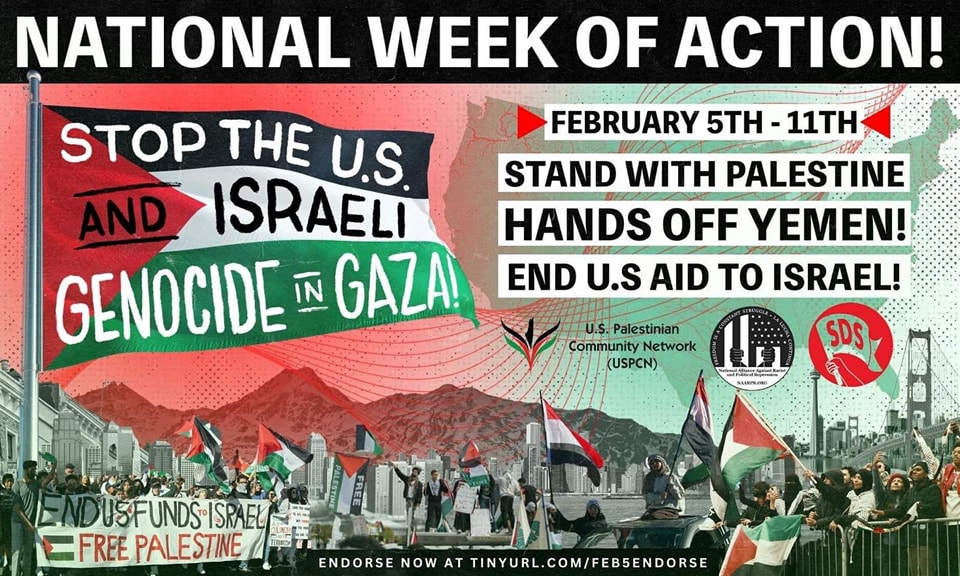
Graphic from Students for a Democratic Society
Flyer from the National Students for a Democratic Society calling for community and student organizations to organize actions and rallies in cities and campuses all across the country #WeekOfAction4Palestine from Feb 5 to Feb 11.
After the administration continually refused or made excuses to deny requests in meeting with the students, the February 9 rally evolved into a sit-in at Chancellor Marc Mone’s office in Chapman Hall where students requested the Chancellor meet with them.
The sit-in resulted in several students being aggressively handled, zip-tied, and detained by over 20 police officers from ten local departments. Five students received citations for conduct violations. Some of them are still dealing with the consequences.
“One student has been suspended for two semesters now,” Students for Justice in Palestine (SJP) member Waleed Yunus confirms. “One of them was punished by basically having his enrollment process delayed so that he wasn’t able to enroll in courses in time for the fall semester, and a similar case happened to a third student.”
Later into the spring, the UWM Popular University For Palestine formed in correspondence with the encampment that took place on campus in solidarity with Gaza, echoing demands that the university cut ties with Israel. The coalition includes student groups SJP, Students For a Democratic Society (SDS), Young Democratic Socialists of America (YDSA), Un-PAC and Muslim Student Association (MSA).
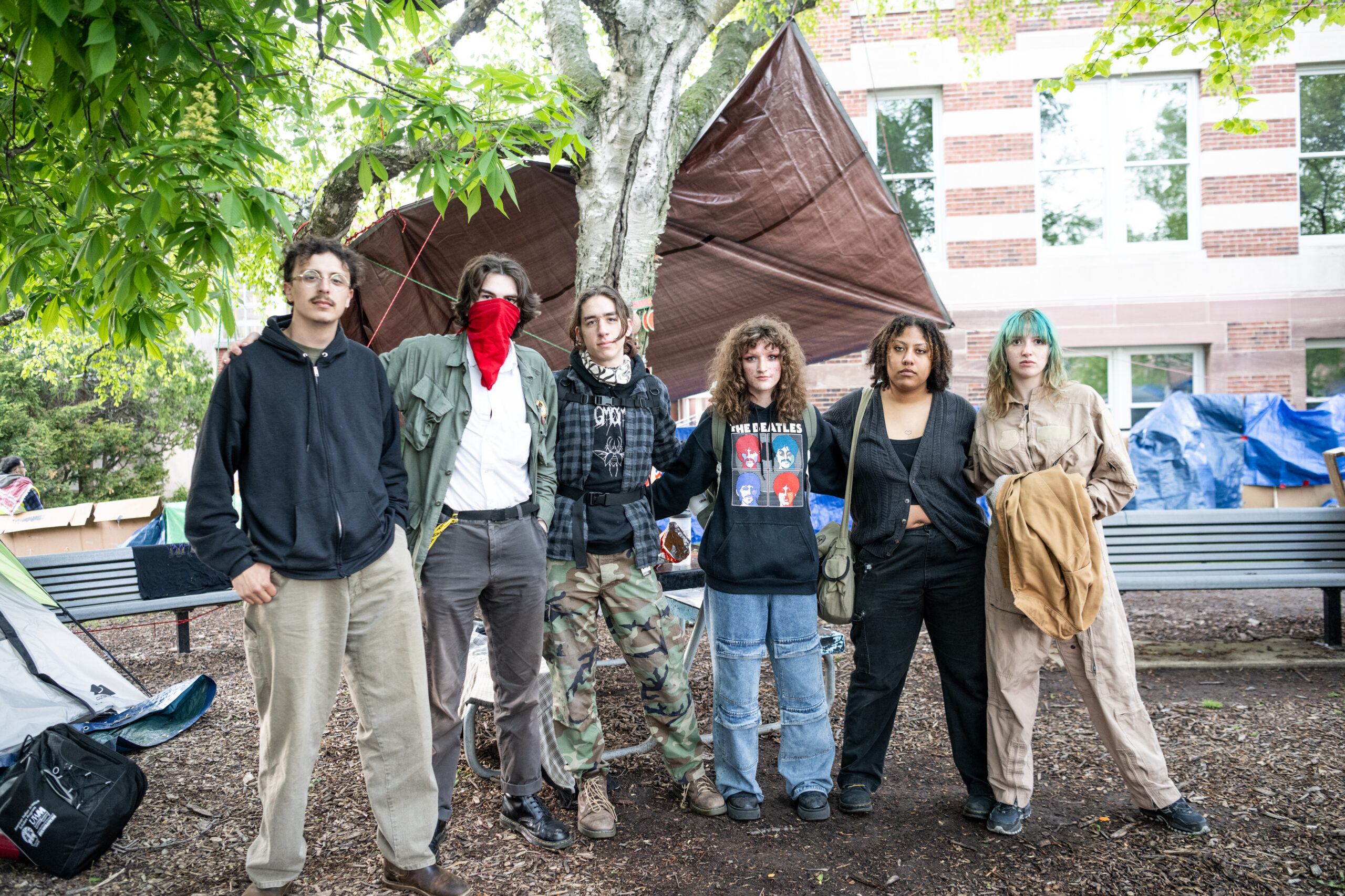
Photo by Mouna Rashid
Students spent 15 days at the “Falasteen Lawn” encampment before the University of Milwaukee – Wisconsin administration came to an agreement regarding the demands of the newly formed UWM Popular University for Palestine Coalition. (Sandra Whitehead)
In an official statement, the Milwaukee Jewish Federation decried the encampment as “unlawful” and “hateful” while also alleging antisemitism, despite the fact that Jewish organizations Chavurat Tziporah and Jewish Voice For Peace led prayer and Shabbat services at the encampment multiple times.
In July, the coalition made a now-deleted Instagram post affirming that maintaining relations with an apartheid state is to normalize extremism. The university administration then sanctioned the involved student organizations on the grounds of antisemitism, despite a large number of Jewish students and community members participating in the encampment, and the fact that there was no mention of Jews or Judaism in the post.
“SJP, MSA and YDSA are all under probation now,” coalition member Sana Abubaker says. “SDS is under suspension.”
Campuses of the UW system adopted a “viewpoint-neutral” policy in September, which prohibits Wisconsin state universities from issuing public statements on matters that do not directly affect university operations.
However, coalition member Ameen Atta describes this policy as a means of keeping the pro-Israel status quo.
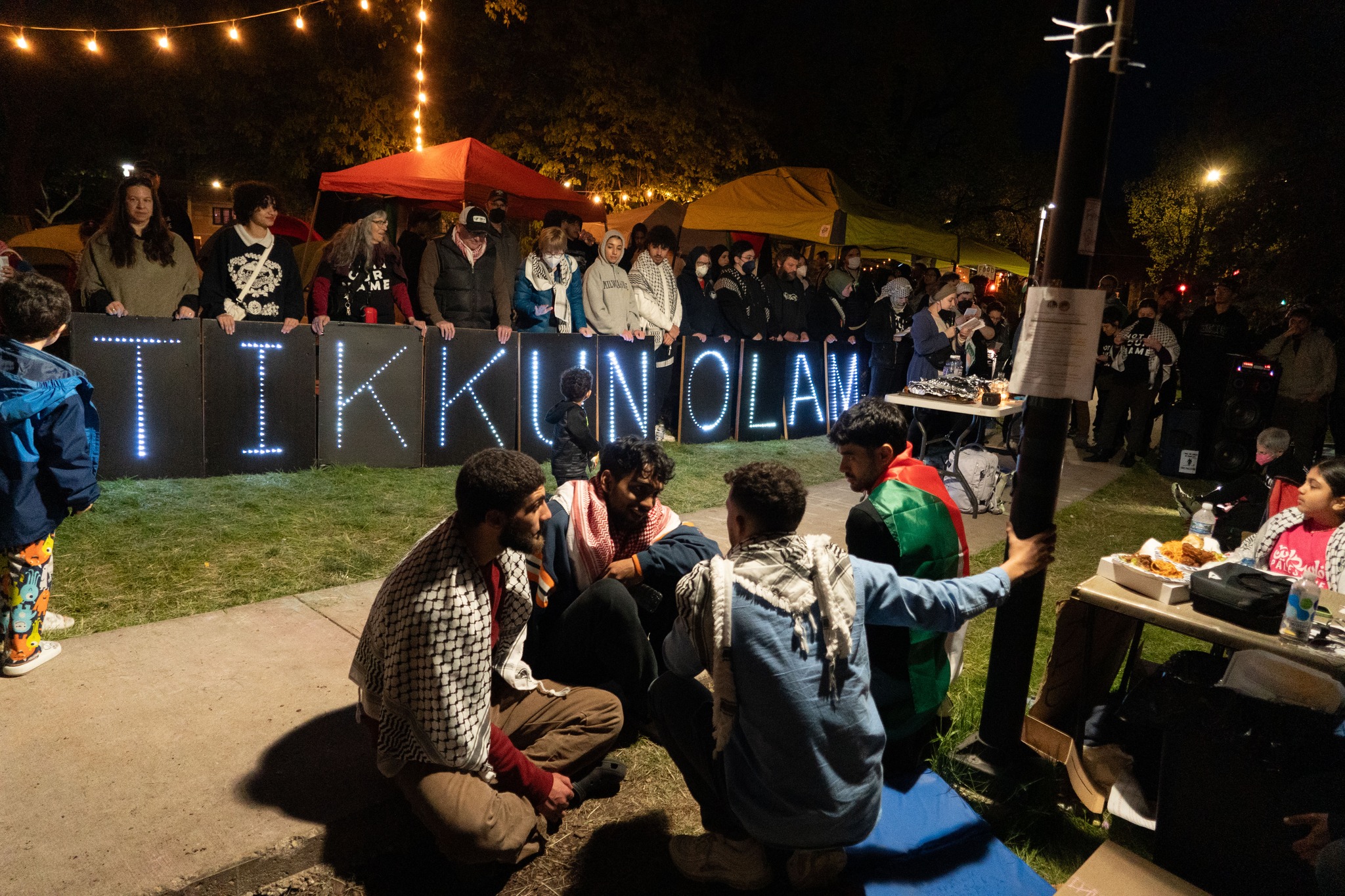
Photo by Joe Brusky
Chavurat Tziporah and Jewish Voice for Peace – Milwaukee hosted Shabbat Shirah May 4 at the UW-Milwaukee Popular University for Palestine encampment. Students hold up letters spelling Tikkun olam, Hebrew for “repairing the world.”
“We saw that become exactly true with their October 7 email, where they explicitly called out Hamas for their actions while they grouped everything else that happened together as “the conflict in the Middle East” but didn’t mention Palestine or Gaza or Lebanon,” Atta elaborates.
“That email bothered a lot of people,” Abubaker adds. “At UWM there’s large Muslim, Arab and Palestinian populations. We have kids who have lost countless family members, and there’s been entire bloodlines wiped out, and for UWM to not even acknowledge that made many of us feel disconnected and dehumanized by the administration.”
UW-Milwaukee recently put out signs displaying instances of prohibited behavior, specifically naming “unauthorized chalking” as vandalism and including “unauthorized use of sound amplification.”
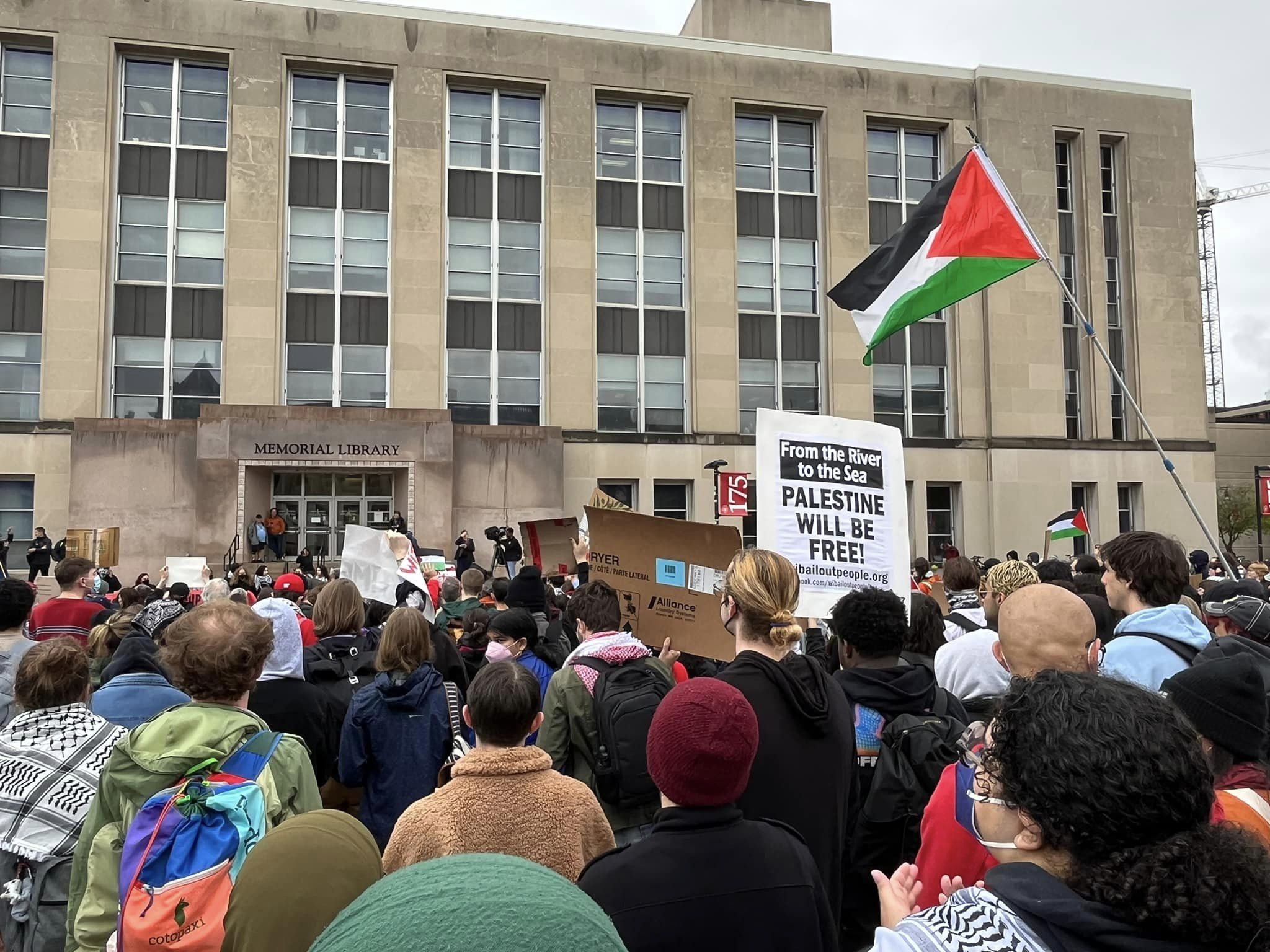
Photo courtesy of WiBOPM
On April 29, on the UW-Madison campus, students and community supporters gathered for a Free Palestine rally at UW Madison April 29, 2024. Immediately following the rally an encampment in solidarity with Palestine began.
Repression in Madison
A similar encampment took place at UW-Madison as well, and theirs even faced physical repression from law enforcement, as permitted by Chancellor Jennifer Mnookin.
Alexander Mixtli of Madison Rafah Sister City Project, Veterans For Peace Madison, and CODEPINK Madison remembers when the police cracked down on the encampment, arresting people and tearing down tents.
“They came out and surrounded us after surveilling us with drones, gathering their forces on one side and tried to take down the tents one by one. There were children and older folks at the encampment, and the cops were pushing people over with shields and tearing apart peoples’ personal property.”
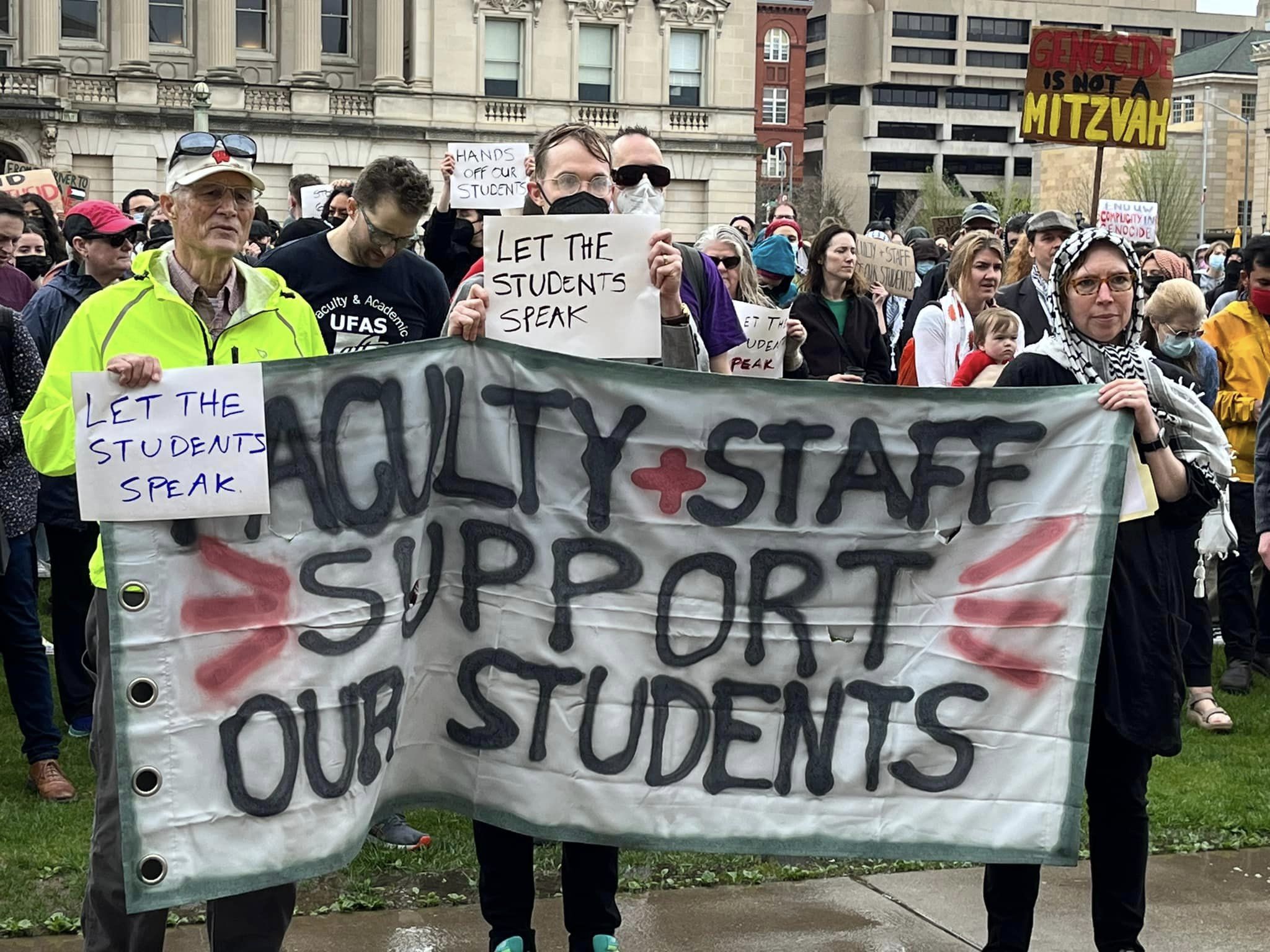
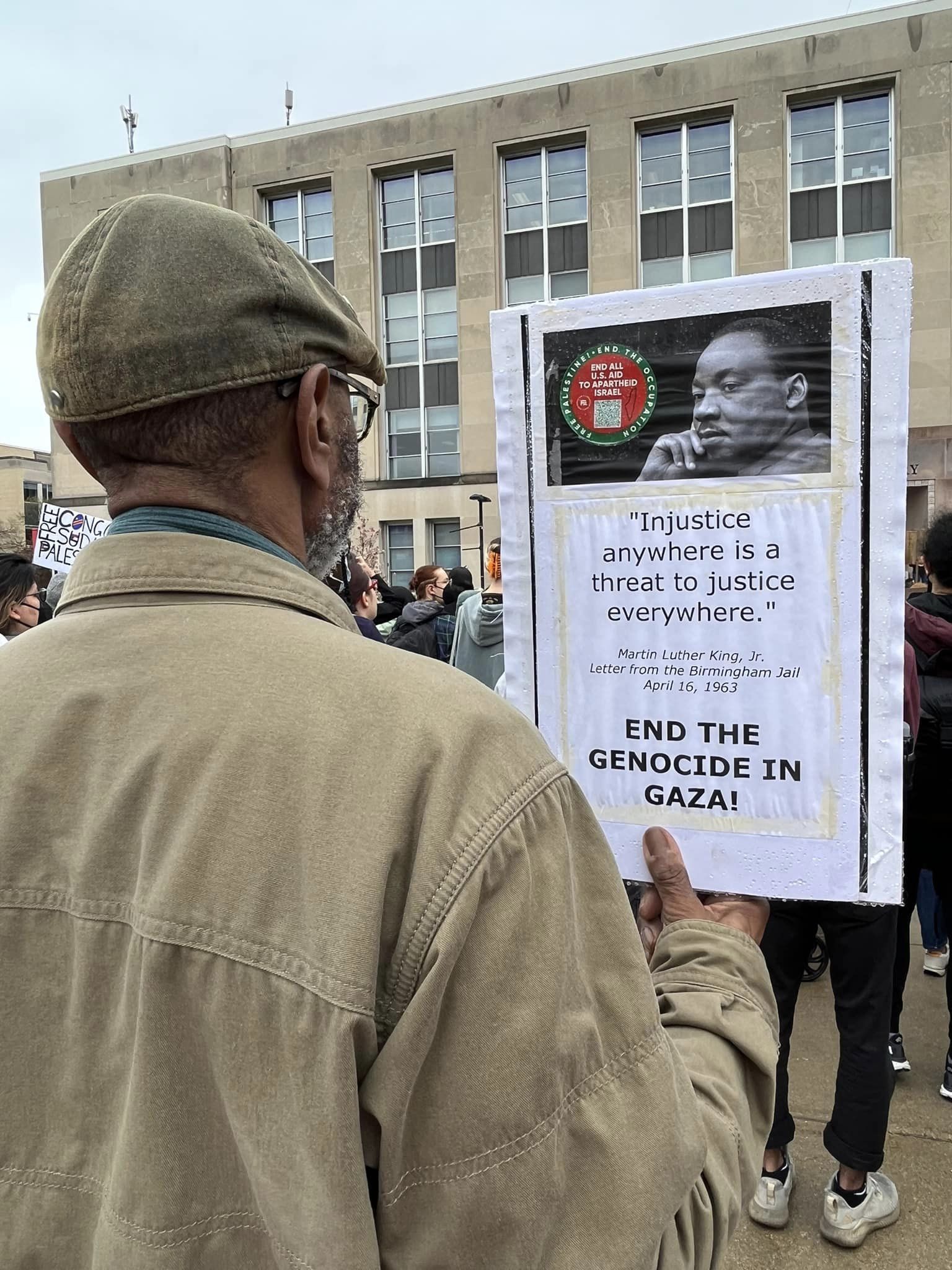
In spite of this, Mixtli describes the encampment as having been a bastion of peace, love and solidarity. “It was welcome and open to all walks of life. Never in my life have I ever seen the community in this capitalist society come behind something together so organically.”
Similarly to UW-Milwaukee, the UW-Madison administration was quick to empathize with the tragedy of October 7, but has failed to address the ongoing genocide against Palestinians.
“It seems like the university didn’t want to negotiate or hear concerns at all, and the way they dealt with the encampment was indicative of that,” Mixtli contends. “We feel very unsafe and unwelcome at campus. I read their land acknowledgements as words that don’t mean anything while they are actively supporting the colonization, genocide and erasure of Indigenous people.”
According to Palestine Legal, two UW-Madison students are still facing disciplinary charges for their involvement in the encampment.
Censorship of Palestinian identity
Not only is solidarity with Palestine censored, but simply existing and being visible as a Palestinian has been vulnerable to censorship.
Fanana Banana, a collective of Middle Eastern and North African (MENA) artists, had been selected by community organization Mitchell Street Arts (MiSA) for an artist residency, which was to begin last summer with an exhibition featuring work by Fanana Banana co-founders Nayfa Naji and Amal Azzam.
The show, titled “In the Shadows of Palestine,” had been themed around Palestinian identity. It was to be the first Fanana Banana show that solely featured members of the collective, and therefore a milestone.
“As a Palestinian, you are always going to mention that you’re Palestinian,” Naji shares. “There’s that fear of being forgotten, as so many of us have been with generations lost. With the displacement, people lose their roots, as much as they try to hold onto them.”
A week prior to when the show was slated, MiSA co-Executive Director Rew Gordon informed Fanana Banana that the organization’s funding from a donor would be at risk of being pulled if the Palestinian exhibition was to be displayed.
“They said that they just wanted to let us know what was happening behind the scenes, but that they wouldn’t be cancelling the show,” Naji explains. “It felt like they were trying to pressure us to cancel the show ourselves, because why else would they be telling us that information?”
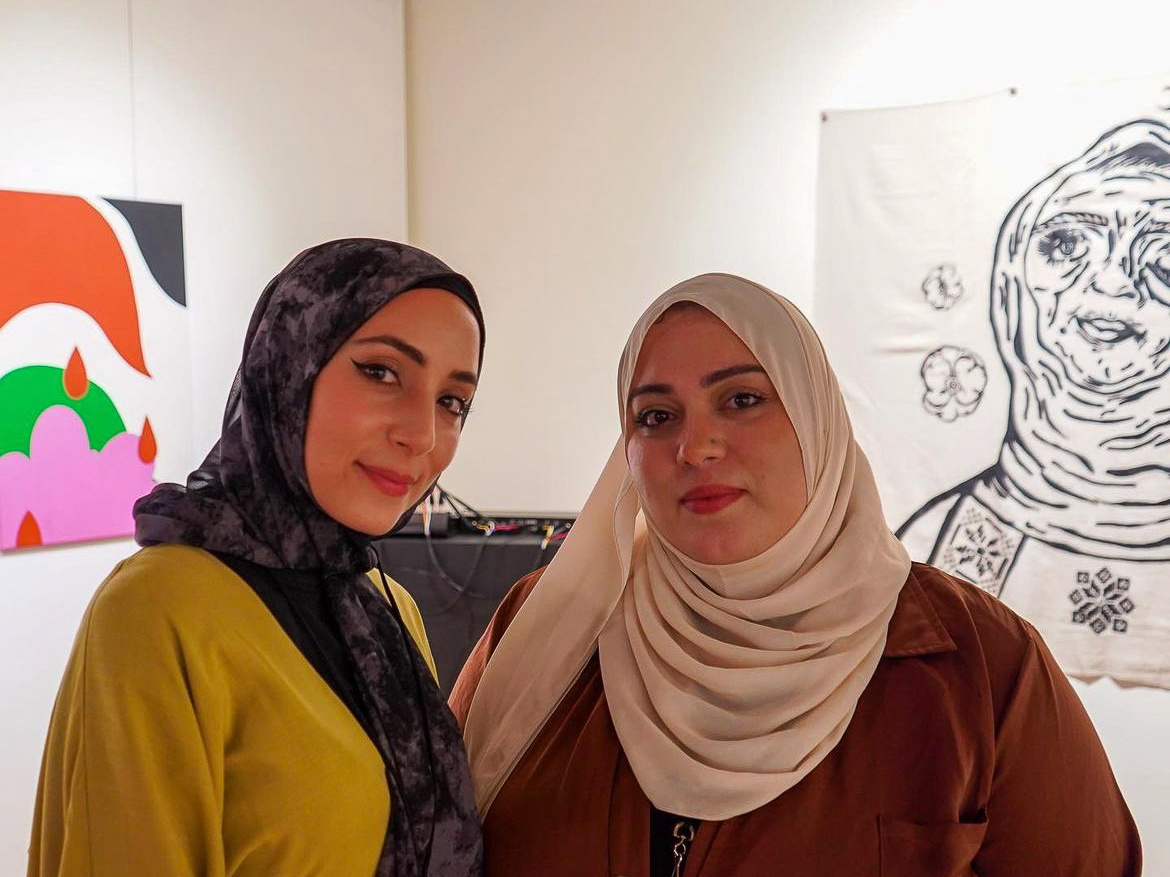
Photo courtesy of Fanana Banana
Amal Azzam (left) and Nayfa Naji (right), founders of Fanana Banana were censored by the threat of sizable funding being withdrawn from Mitchell Street Arts.
A few days later (a few days before the show), Gordon informed the artists that a second funder had been threatening to pull funding.
“They said that no one in the community wants to touch this topic on Palestine at all,” Naji continues.
MiSA subsequently cancelled Fanana Banana’s show without even viewing the artists’ work.
“We said that we would be putting out a press release and that this would become public knowledge,” Naji adds. “Their immediate response to that was them offering to share funding and do other programs for us, and it was just like, you’re not going to sit here and humiliate us and belittle our dignity in the sense of trying to buy us out. At the end of the day, as Palestinians, as women, as artists, we stand strong by who we are and the work we do.”
Naji and Azzam then learned via phone conversation that they had been lied to about the second donor threatening to pull funding. “They lied about one org to protect another,” Naji says.
Despite the show’s cancellation, Naji and Azzam maintain a residency at MiSA, but Naji has felt disillusioned by the organization since. “I can’t even step into those doors and feel like I’m comfortable in there.”
In fact, she attests that the situation has put her into a creative block over the last few months. “I honestly haven’t really created anything since then,” she adds. “One of the reasons why we started Fanana Banana to begin with was because there wasn’t a space that was welcoming enough for people like me.”
Fanana Banana put out a press release detailing their experience with MiSA, and fellow Milwaukee artists and community members rallied in their support, with some folks even offering their spaces for the cancelled show.
“All of the people who reached out, it was very much appreciated,” Naji affirms. “The art community really was there for us at a time where I literally couldn’t even think straight, and it’s something that I don’t take for granted.”
She concludes, “Art is meant to spark conversations; it’s not meant to shut them down.”
Sparking community discussion
In September, as a means of sparking community discussion, Palestinian community member and businessman Ihsan Atta commissioned a mural for one of his buildings situated between Milwaukee’s Riverwest and Harambee neighborhoods.
The mural, combining a swastika with the Star of David while depicting various instances of Israeli violence and destruction, reads “The Irony Of Becoming What You Once Hated.”
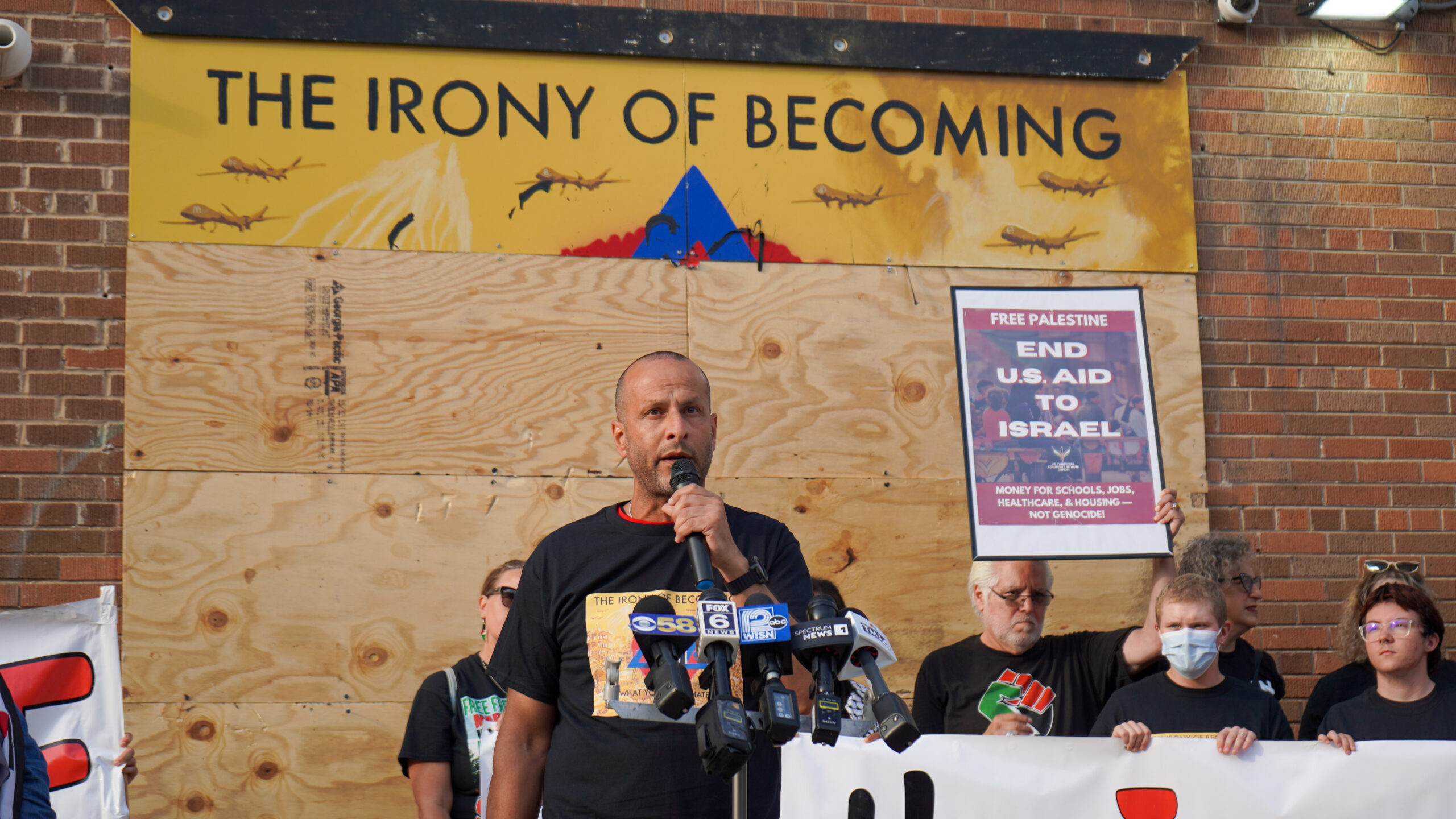
Photo courtesy of Ihsan Atta
Palestinian American Ihsan Atta, commissioned a mural showing impacts of Israel’s bombardment of Gaza spoke to the press in after the mural on his building was vandalized.
Atta says that his intention to put up a mural depicting the Palestinian struggle came early on after October 7. “As the genocide continued, and every day we saw it get worse and worse when you thought it couldn’t get worse, I needed a strong message, something that represented as best as possible the situation on hand.”
Upon unveiling the mural in September, Atta immediately faced backlash from community members claiming that the mural was antisemitic and divisive. The Milwaukee Jewish Federation, as well as Common Council members, condemned the mural and demanded its immediate removal, offering little to no acknowledgement of its political commentary.
“I knew that Zionists would reference that way, but I thought that everyone else would recognize and understand it,” Atta comments on the antisemitism allegations.
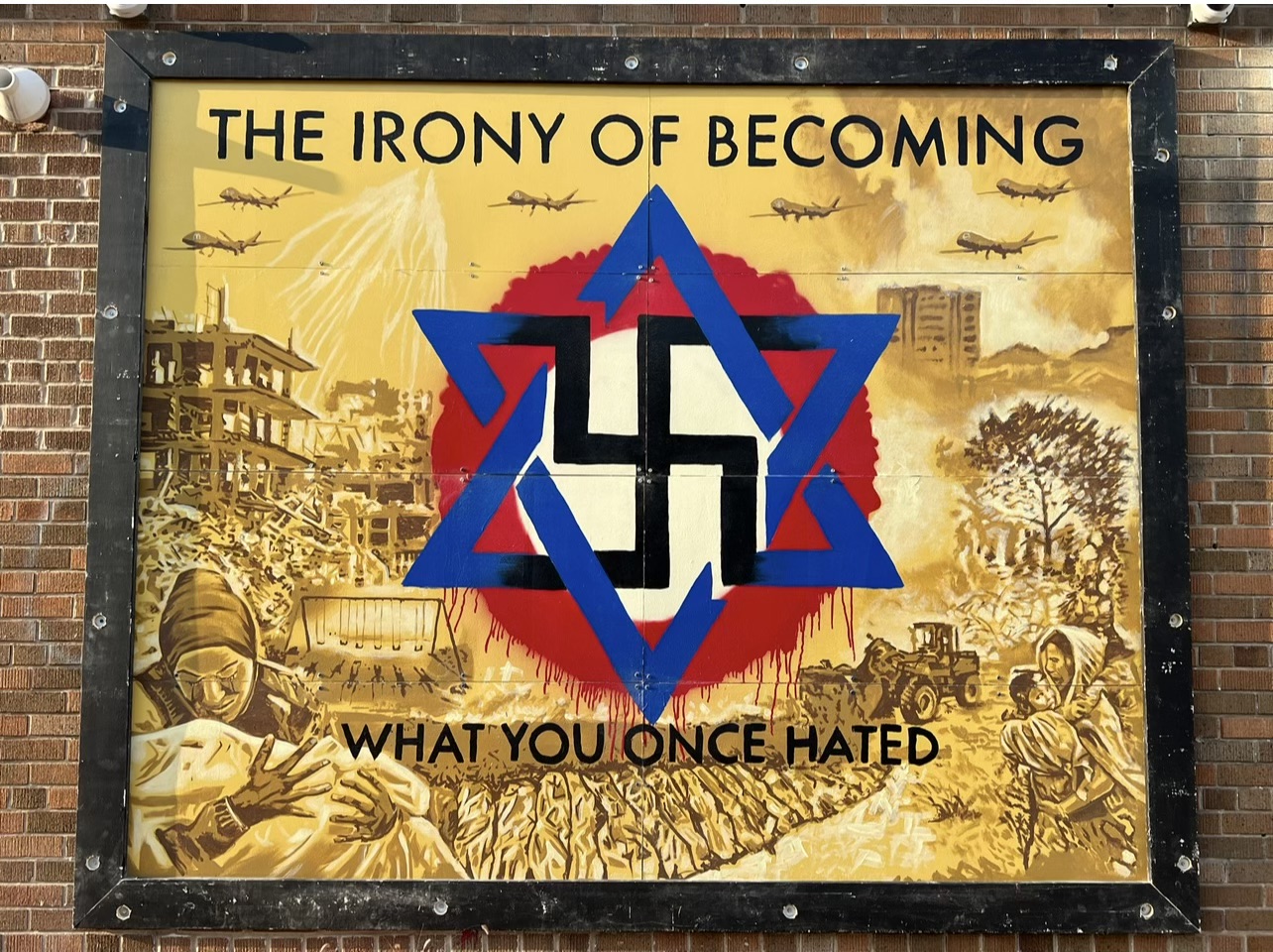
It did not take long for Atta’s mural to get vandalized – three times. It got defaced with black paint, and then a father and son came and damaged the mural with various tools including an ax and sledgehammer.
Zechariah “Zee” Mehler, the father, describes himself as a member of Betar, a Revisionist Zionist and Jewish fascist organization.
“I look at him as a person with low self-esteem who wanted to be a hero in his racist community,” Atta remarks about Mehler. “It’s funny because at one point, as I was watching the security camera, they actually stop and admire the artwork.”
Despite this, Ihsan Atta confirms that, while critiques about the mural’s language were given (since the Star of David was a Jewish symbol before a Zionist one), he received substantial community support for the mural and its message, including from anti-Zionist Jewish community members. “The noise came from a select few. People left voicemails at our business in support of it.”
Local Milwaukee news stations, CBS 58, Fox 6, WISN 12, TMJ4, and Spectrum News were present at the WCJP’s press conference in front of the mural that was vandalized twice. (Click on image to watch)
Anti-Zionist Jewish voices
Censorship of anti-Zionist Jews has occurred as well. In November, Milwaukee Jewish leader and community member Jess Annabelle had been invited by the Milwaukee Jewish Federation to speak at their Transgender Day of Remembrance event.
In a speech, Anabelle planned to mourn the Palestinian and Jewish lives lost since October 7. Once the Federation learned of this, they suggested adjustments in the form of omissions of mentioning the lost Palestinian and Jewish lives.
“I would want to speak for what’s important to me, which is being part of healthy, inclusive and resilient communities,” Annabelle affirms.

Jess Annabelle, Milwaukee Jewish leader and community member
“I know what my own values are, and I think it’s essential for us to be honest about our feelings, and so I don’t think there’s anything political or controversial in the least about saying that it’s sad that I lived through the loss of tens of thousands of lives in the last year.”
Annabelle made clear to the Federation that integrity was important here and refused to make the omissions. The Federation then revoked Annabelle’s invitation to speak.
“I have gratitude to my communities that I serve, and I’m unwilling to disconnect or abandon the people that I love,” Annabelle comments. “I’ve unfortunately heard from quite a lot of other Jewish people that they have previously been bullied by the Federation or that they’re afraid to speak because of fear of being shunned or exiled.”
Antisemitism arguments against pro-Palestine and anti-Zionist advocacy have become less effective, especially as an increasing number of Jewish folks not only support Palestine but reject Zionism as a component of their Jewish identity. According to a Mosaic United survey, now almost two thirds of Jewish-American teens aged 14-18 say that they sympathize with Palestinians.
The bigger picture
Instances of pro-Palestine and anti-Zionist censorship have occurred at all levels, nationwide, even long before October 7. But these stories tell us something, locally speaking, about the current societal landscape of censorship relative to this issue.
After each instance, communities rallied fervently in support of those censored or repressed. This reflects growing class consciousness between different groups and identities, as well as more widespread rejection of pro-imperialist U.S. media narratives.
Like a domino effect, such shifting attitudes also means that various Western exceptionalist tropes, ranging from Israel being “the only democracy in the Middle East” to the U.S. having respect for the laws of war, are getting put increasingly into question.
Both Amnesty International and Human Rights Watch have conclusively found that Israel is committing genocide. Although the International Criminal Court (ICC) recently issued arrest warrants for Israeli Prime Minister Benjamin Netanyahu and former Israeli Minister of Defense Yoav Gallant for crimes against humanity, the White House since welcomed the latter without arresting him.
It is only a matter of time before the U.S., its complicit institutions and its supporters must answer to these double standards and support for war criminals and genocide.
